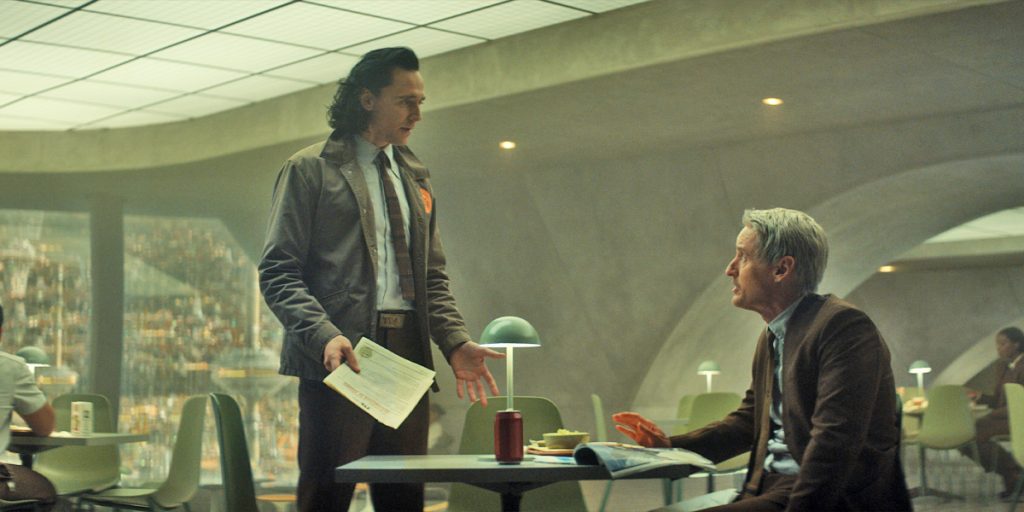In Loki ‘s Season 1 Episode 2, “history’s most reliable liar” and a man with “a soft spot for broken things” join forces and embark on a journey through time, learning a few things on the way.
The following review contains spoilers for Season 1 Episode 2 of Loki.
How is it possible that Loki ‘s Season 1 Episode 2 is even better than the first? Last week, the much-anticipated Disney+ show gave us a Premiere like no other, with a genre-bending episode that, at the same time, saw our titular villain be his adorable, mischievous self but also grow into a self-aware protagonist with a whole lot of feelings and a new purpose. Not only that, but it also got us acquainted with the many rules and customs of what we now know as the Time Variance Authority, and it effectively introduced the multiverse.
Season 1 Episode 2 picks up where the Premiere left off, with Loki (Tom Hiddleston) trying to familiarise with the TVA’s many rules, and earn Agent Mobius’s (Owen Wilson) trust in the process, and ultimately teaming up with “the greatest power in the universe” to hunt another Variant. As we already know from Episode 1, that Variant is none other than another time-altering version of himself that originated from a Nexus event and that has now gone rogue, having found a way to keep changing the course of history while staying undetected by the TVA’s Hunters. But what we find out in Episode 2 is that this misbehaving Variant is not the only Loki the TVA has ever had to deal with, as history is full of apocalypses that Loki helped create, including Ragnarok itself. Which makes our hero’s quest for answers on his own identity and purpose, as well as the possibility of free choice, an even more complex issue than he thought.
Season 1 Episode 2 is remarkable in more than one way. On one hand, director Kate Herron (Sex Education) and screenwriters Michael Waldron (also the series’ creator) and Elissa Karasik remind us of everything we learned in the Premiere, while also adding additional information on the intriguing world of the TVA, by using Miss Minutes‘ (Tara Strong, of Batman: The Killing Joke) lessons to Loki as a device to provide us with the background knowledge we’ll need to understand the episode’s events. And so, our favourite Southern clock cheerfully tells us that, if a Nexus event branches past the red line, the TVA can no longer reset it, and that leads to the eventual destruction of “reality as we know it”.
This ensures we understand what the Hunters’ reset charges are for: those devices enable the TVA to eliminate any alterations to the timeline that haven’t reached the red line yet, restoring the correct flow of time. What we learn at the beginning of the episode is key for understanding what happens next, as the TVA’s reset charges and portals play a major role in “Bad Loki”‘s plan, which involves stealing as many of them as he can, to eventually prevent the Hunters not only from eliminating the branches, but also from returning to the TVA’s Headquarters.
But a lot more happens in Season 1 Episode 2, starting from the development of more than one fascinating relationship between the show’s protagonists.

The first is the relationship between Mobius and Loki – a bond that was established in the Premiere, and that grows into something even stronger in “The Variant”, where we understand not only how similar the two characters are, underneath it all, but also how, together, they paradoxically make each other whole. In Episode 2, Loki is his back to being his usual smug, lovable self – a God of Mischief who loves making jokes and creating chaos as much as he loves hearing the sound of his own voice and pretending to go along with other people’s plans only to switch sides at the very end, and a man whose routine is so consistent that his advice for catching himself is to “expect the expected”. But Mobius is no fool: having been studying Loki his whole life, he can see right through him; he expects the God of Mischief to be “insubordinate, stubborn and unpredictable”, and he knows how to determine whether he’s lying or he’s telling the truth. Which not only destabilises Loki, but also creates an interesting dynamic between the two of them, as they can truly approach one another as equals.
There’s plenty of fanfiction material in Season 1 Episode 2, from name-calling and teasing to tampering with salads, from everchanging teacher/student dynamics to a whole lot of banter. But there are also many meaningful moments, which come from the realisation that both characters are somewhat incomplete. Which is exactly what happens when “history’s most reliable liar” meets a man who has “a soft spot for broken things”: if Loki has managed to have adventures on many planets, defeating death a million times, he has also never truly found himself in the process. On the other hand, Mobius knows exactly who he is, but he has never been able to experience anything. Even if they come from two very different worlds, Loki and Mobius complete each other – the former doomed to always fail, and the latter destined never to live – and what we witness in “The Variant” might just be the beginning for an even stronger relationship between the two in the future.
But there’s another important relationship to examine in Season 1 Episode 2, which resides in the conflict between two different versions of the same character – the Loki who may or may not be working for the TVA, and the Loki who comes from the future, and who plans to cause as much mayhem as he can. What makes this relationship so fascinating is that, since the two characters are – or, at least, used to be – one and the same, they can absolutely predict each other’s actions. And so, Present Loki is able to find Future Loki as soon as he takes a look at his own file, as he knows what he would do if the situation was reversed. But so does Future Loki, which means that he can anticipate his hunter’s actions, and change his plans accordingly.
Even if these two Lokis have different backgrounds and motivations, they still have enough in common to be able to set traps for one another, and this calls not only for incredibly fascinating storytelling, but also for a meditation on identity, free will, and Loki’s evolution as a character. Is Present Loki destined to always embody the archetype of a villain – a character whose very existence is justified by the hero’s need to defeat him – or can he evolve into a multilayered, complex being who is truly in command of his own choices and able to let himself feel? Can Loki learn to do the right thing and trust others or is he always going to be alone and unhappy, and ultimately fail? Judging by what we’ve seen in “The Variant”, anything could happen, and the episode’s ending certainly anticipates more choices to be made by our protagonist in the future. After all, Loki himself believes that “no one bad is ever truly bad, and no one good is ever truly good”.

Speaking of heroes and villains, there is another entity that needs to be considered, and that is the Time Variance Authority itself. As Loki rightfully points out, the TVA would seem to have quite a lot of power and authority, as well as the habit of seizing every opportunity to do as much propaganda as possible, in the best traditions of any authoritarian, oppressive regime. Not only that, but this all-powerful authority that sees and monitors everything, big brother-style, is also a silent and invisible one, as not many people have actually seen the person who sits at the top of the organisation.
After all, even Loki’s charm isn’t able to earn him access to any files that aren’t his own, including those on the beginning of time and the creation of the TVA itself, and there’s a thin line between the desire to create a world with no chaos and the ability to control information to such extent that you control the very notion of reality. Though it’s safe to say that Mobius might be one of the good guys, the nature of the TVA remains one of Loki‘s many mysteries, and secrets are bound to be revealed later in the series, especially considering that Loki envisages eventually taking control of it.
Which brings me to our protagonist. If, in the Premiere, we struggled, at first, to recognise the Loki we all know and love, due to the unfamiliarity of the situation in which he found himself, “The Variant” shows us a God of Mischief who’s in splendid form. In fact, not only is Loki his usual ironic, egocentric self in this episode – perhaps as a result of having come up with a new plan, but he’s also unusually giddy and energetic. And so, he makes jokes, he improvises, he gloats, he brags about his abilities, and he shows off his Latin skills by cheerfully telling Pompeii citizens that they’re about to die, giving us the most hysterically funny scene of the series so far.
And the humour and the irony are reflected in every detail of the episode, starting from a wonderful throwback to Footloose by means of the exquisitely familiar notes of Bonnie Tyler’s “Holding Out For A Hero”, which reach our ears at the exact right moment to make us giddy and nostalgic ourselves, as we realise just how appropriate the lyrics are for our titular character. “Where have all the good men gone and where are all the Gods?”, asks Bonnie Tyler, and, as we, too, hold out for a hero to root for, we can’t help but hope that the God of Mischief might turn out to be one of the “good men” she’s trying to conjure.
In the best Marvel tradition, Loki ‘s Season 1 Episode 2 also raises a lot of questions. Some are minor, like the puzzling appearance of a pen that Mobius uses to sign some documents, with an inscription that reads “Franklin D Roosevelt High School“, which could either be an obscure Easter Egg or a meaningful clue whose meaning we’ll get later on, like WandaVision‘s commercial for Nexus.
But most of our questions revolve around the identity of Future Loki, as the end of the episode reveals that our Evil Variant is not portrayed by Tom Hiddleston, but by Sophia Di Martino (Yesterday). Which wasn’t exactly unexpected, as not only has the show made it a point not to show us Evil Loki’s face until the very end of Episode 2, hence suggesting that they might not look like we’d expect them to, but, a few days before the Premiere aired last week, a teaser was released that shone a spotlight on Loki’s gender fluidity. Keeping in mind that Lady Loki actually exists in Marvel’s comic book universe, where she was born out of Ragnarok, her appearance in the show is not exactly uncalled for. What’s yet to be determined is her future role in the series: Loki makes it a point to explain that there’s a difference between his abilities to project illusions and to actually create duplicates, but Evil Variant/Lady Loki shows us that Loki can take over bodies too. This means we can probably expect both (or possibly even more?) Lokis using all three abilities at some point, which might shed further light on the God of Mischief’s many identities.
At the end of it all, the most important question “The Variant” leaves you with is whether or not our hero is actually able to change. An even longer chapter than its previous one, Loki‘s Season 1 Episode 2 continues on the path set by the Premiere, giving us yet another highly entertaining, incredibly fun episode that has enough mystery to keep us engaged, enough heart to make us love every single interaction between its charismatic characters, and enough philosophical ruminations on identity and free will to make us think about the nature of good and evil. We absolutely can’t wait to find out what’s going to happen next.

 loudandclearreviews.com
loudandclearreviews.com
